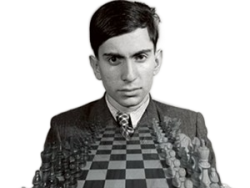
Why It’s Better to Be an Amateur than a World Champion
27.12.2024 05:00 | HistoryBeneath the glamorous surface of chess stardom lies relentless pressure and sacrifice. World champions bear the weight of high-stakes matches and constant scrutiny—while amateurs find greater freedom and pure enjoyment in every move.
The High Price of Genius
Chess history offers countless examples of players who achieved great fame but at a heartbreaking cost:
Bobby Fischer (1943–2008)
The brilliant American who defeated Boris Spassky in 1972 to become world champion, an emblem of Western prowess during the Cold War. Yet Fischer’s genius came with paranoia, conflicts, and isolation. He had a falling-out with U.S. authorities and spent much of his later life in exile. Even his phenomenal chess skills failed to bring him lasting personal happiness.Magnus Carlsen (b. 1990)
A modern phenomenon and one of the youngest world champions in history. While he often appears energetic and confident, Carlsen has spoken about the immense pressure that comes with the title. The endless tournament circuit, constant travel, exhausting matches, and countless hours of preparation all weigh heavily on a player’s mental and physical well-being.Wilhelm Steinitz (1836–1900)
The first official world champion (1886) and the father of modern chess strategy. Though he achieved worldwide fame, Steinitz died in poverty and suffered from mental illness. His groundbreaking theories revolutionized chess, but he did not find peace in his later years.Paul Morphy (1837–1884)
The American “chess genius before Fischer.” Morphy gained widespread acclaim for his extraordinary performances and became an unofficial world champion. However, his brilliant career was short-lived, and a steep decline followed. He withdrew from public life and later struggled with severe psychological problems.
Sadly, there are many other examples of top players who ended up in hardship or mental anguish. Their stories illuminate the darker side of reaching the summit of the chess world.
The Pressure on Professionals
Modern professional chess brings pressure that outsiders can barely imagine. Every move is analyzed, criticized, and dissected by the media, fans, and fellow grandmasters. Each game can be a turning point in a career. Former world champion Garry Kasparov once called professional chess “war without blood.” While players may sit quietly at a table, they wage an intense internal battle that drains them both mentally and physically.
We can look at recent high-stakes World Championship matches where a single misstep—like Ding Liren’s fateful blunder in a drawn position—can cost the title. Years of hard work and preparation can unravel in mere seconds. This unyielding pressure has the power to break even the strongest of individuals.
The Freedom of Amateurs
Why, then, do some people prefer to remain “simple” amateur chess players? The answer is straightforward: freedom. An amateur can play purely for the joy of the game, free from the strict demands of results or public scrutiny. There’s no fear of sensational headlines or disappointed sponsors. Lose a game? No worries. Just click “New Game” or set up the board again.
Amateurs also have time for family, friends, and other hobbies, since chess isn’t the absolute center of their world. It becomes a healthy outlet—relaxation and mental exercise rolled into one. You can comfortably learn from mistakes and enjoy exploring strategies without putting your job or personal life on the line.
Who’s the Real Winner?
The beauty is that both paths have their merits. Professionals experience the euphoria of victory, applause from crowds, and a form of chess immortality—but they often pay a steep price. Amateurs miss out on financial rewards and media attention, but they can fully embrace the simple pleasure of each move.
Whether you aspire to master chess at a professional level or you’re happy playing online against a friend halfway around the world, never forget that chess is ultimately about the joy of the game. It doesn’t matter whether you win or lose—only that each move broadens your horizons and brings you satisfaction.
“A chess game begins in stillness and ends in wisdom.” – old saying
For some, wisdom lies in trophies and medals; for others, it’s found in a calm, carefree amateur game. Both paths are valid as long as they truly make you happy.
